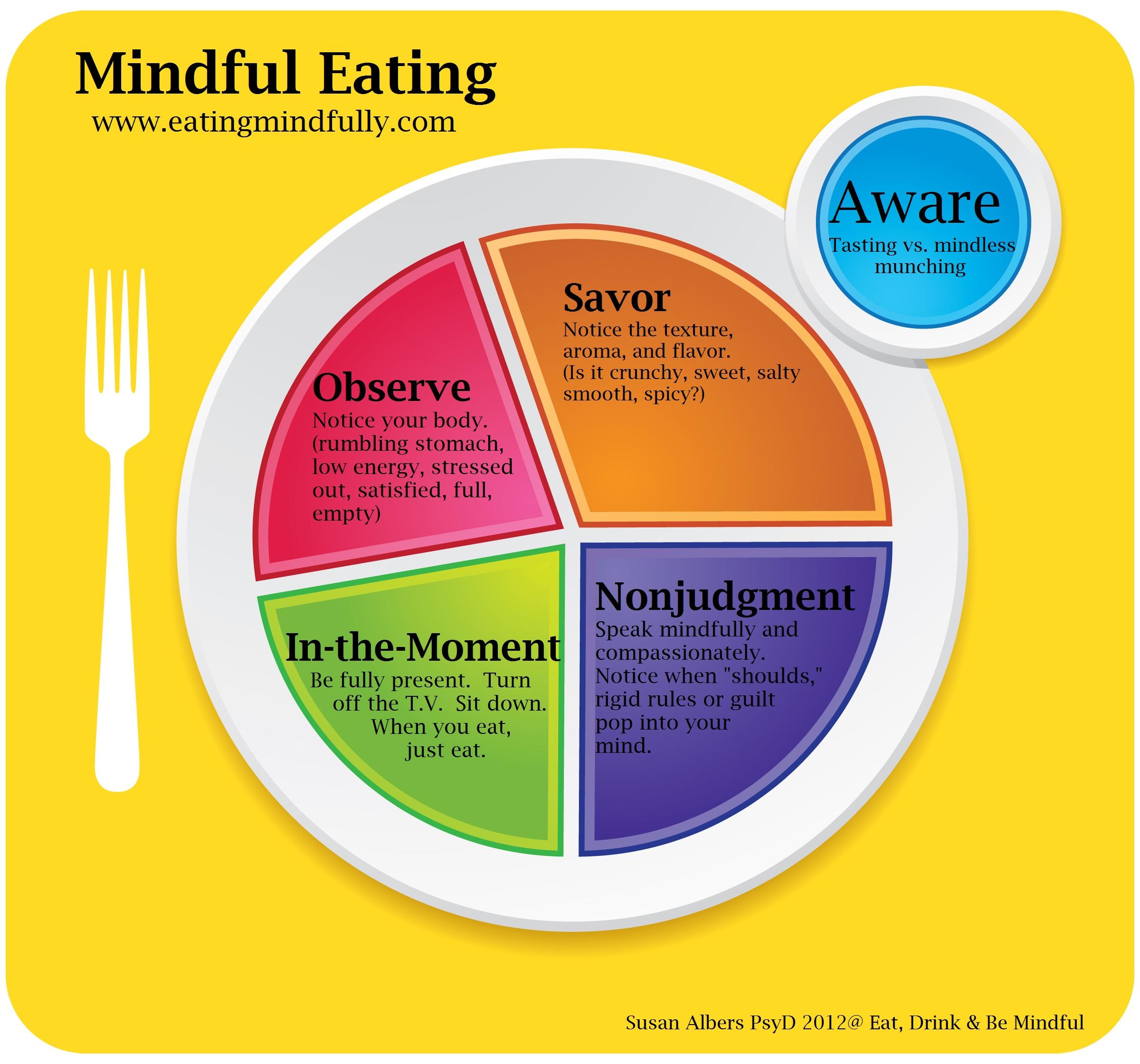In a world where we often find ourselves racing against the clock, mindlessly devouring meals without a second thought, it’s time to hit the pause button and savor every morsel. Welcome to the remarkable journey of mindful eating – a harmonious union of nourishment for the body and soul. In this fast-paced society, where convenience often trumps intention, it’s no wonder that we’ve disconnected from the true essence of food. But fear not, for with mindful eating, we embark on a transformative adventure that awakens our senses, restores our relationship with food, and nourishes both body and mind. So gather your culinary curiosity, prepare to indulge in the enchantment of flavors, and let us embark on a mindful exploration of the art of nourishing ourselves, one delicious bite at a time.
Headings:
Mindful eating for a healthier you
When it comes to nourishing your body and mind, it’s not just about what you eat but how you eat. Mindful eating is a practice that focuses on paying attention to the present moment and savoring each bite, leading to a greater appreciation for food and an overall healthier approach to nutrition. By adopting mindful eating habits, you can transform your relationship with food and enhance your overall well-being.
The benefits of mindful eating:
- Improved digestion: By eating slowly and consciously, you give your body time to properly digest food and absorb nutrients.
- Weight management: Mindful eating helps you become more aware of physical hunger and fullness cues, enabling you to make better choices and avoid overeating.
- Reduced stress: By focusing on the sensory experience of eating, such as the taste, texture, and aroma of food, you can enter a state of relaxation and reduce stress levels.
- Enhanced satisfaction: When you take the time to truly enjoy each bite, you derive more satisfaction from your meals, leading to increased overall contentment.
Tips for practicing mindful eating:
- Eat without distractions: Avoid multitasking or eating in front of screens to fully engage with your food.
- Listen to your body: Pay attention to hunger and fullness cues, and eat until you are satisfied rather than stuffed.
- Savor every bite: Take the time to truly experience the flavors, textures, and smells of your food.
- Mindful meal planning: Plan your meals ahead of time, and make conscious choices to include nutritious and satisfying foods.
To truly nourish your body and mind, practicing mindful eating can be a transformative journey. By being present and attentive during meals, you can develop a deeper connection with your food and ultimately cultivate a healthier, more balanced approach to nutrition.

1. Embracing Mindful Eating: A Holistic Approach to Nourish Body and Mind
In today’s fast-paced world, it’s easy to find ourselves mindlessly devouring our meals, barely aware of what we’re eating or how it affects our bodies. However, by embracing the concept of mindful eating, we can transform our relationship with food and nourish both our bodies and minds in a holistic way. Mindful eating is a practice that encourages us to pay close attention to our eating habits, thoughts, and sensations, fostering a deeper connection with the food we consume.
One of the key aspects of mindful eating is savoring each bite. By taking the time to truly experience the flavors, textures, and aromas of our food, we can enhance our enjoyment and appreciation for every meal. This approach allows us to slow down, be present in the moment, and cultivate a greater sense of gratitude for the nourishment our bodies receive.
Moreover, mindful eating also emphasizes the importance of listening to our bodies and honoring their needs. Instead of consuming food out of habit or emotion, we learn to tune in to our hunger and fullness cues, ensuring that we eat when we’re truly hungry and stop when we’re satisfied. By developing this awareness, we can make more informed choices about what and how much we eat, ultimately leading to a healthier and more balanced lifestyle.
Additionally, by incorporating mindfulness into our eating routines, we can bring a sense of calm and tranquility to our meals. Taking a few moments to breathe deeply before diving into a dish can help us center ourselves and create a peaceful atmosphere. This mindful approach can also enhance our digestion, as the relaxation supports optimal nutrient absorption and minimizes digestive discomfort.
Overall, mindful eating offers a holistic approach to nourishing both our bodies and minds. By savoring each bite, listening to our bodies, and bringing mindfulness to our meals, we can develop a healthier relationship with food and cultivate a sense of balance and well-being in our lives.
2. The Science Behind Mindful Eating: Understanding the Impact on Well-being
As the saying goes, “You are what you eat.” But what if I told you that how you eat also has a significant impact on your well-being? Mindful eating, a concept deeply rooted in the principles of mindfulness, goes beyond simply choosing healthy food options. It’s about cultivating a deeper connection with the food we consume, nourishing not only our bodies but also our minds.
The science behind mindful eating is fascinating. Research has shown that practicing mindful eating can lead to a range of positive benefits, including improved digestion, enhanced satisfaction with meals, and even weight management. When we eat mindfully, we’re more attuned to our body’s hunger and fullness cues, allowing us to make better choices and prevent overeating. By paying close attention to the taste, texture, and aroma of each bite, we can also savor our meals more fully, leading to a greater sense of satisfaction. Through this practice, we can develop a healthier relationship with food and ultimately enhance our overall well-being.

3. Practical Tips for Cultivating Mindful Eating Habits to Promote Health
Practicing mindful eating is a powerful tool to nourish both your body and mind. By being conscious of what and how you eat, you can establish a deeper connection with your food and make more intentional decisions that support your overall well-being. Here are some practical tips to help you cultivate mindful eating habits:
- Savor each bite: Slow down and truly appreciate the flavors, textures, and aromas of your food. Take the time to chew slowly and fully experience every mouthful. By doing so, you will not only enhance your eating experience but also allow your body to recognize its fullness signals, preventing overeating.
- Avoid distractions: Turn off the TV, put away your smartphone, and create a calm environment free from distractions during meals. By focusing solely on your food, you can tune in to your body’s hunger and fullness cues more effectively, enabling you to make healthier choices and enjoy your meals more mindfully.
- Listen to your body: Pay attention to the signals your body sends you. Eat when you’re truly hungry and stop when you’re comfortably full. Allow yourself to enjoy a variety of foods in moderation, without judgment or restriction. Trust your body’s wisdom and eat intuitively, honoring its unique needs.
By incorporating these simple yet powerful tips into your daily routine, you can transform your eating habits and nourish your body and mind in a more mindful way. Remember, the journey towards mindful eating is a practice, and it takes time to develop. Be patient with yourself and embrace the process, knowing that every small step you take brings you closer to a healthier, more balanced relationship with food.

4. Mindful Eating: Savor the Journey towards a Balanced Relationship with Food
In our fast-paced world, it’s all too easy to lose touch with the simple act of eating. Mindful eating, however, invites us to pause and savor each moment, transforming the way we nourish our bodies and minds. By practicing mindful eating, we can cultivate a more balanced relationship with food that goes beyond mere sustenance.
One of the key aspects of mindful eating is slowing down and truly savoring the flavors and textures of our food. Rather than mindlessly consuming our meals, we can bring awareness to each bite, allowing ourselves to fully experience the joy and pleasure of eating. This mindful approach not only enhances our appreciation for food, but it also helps us to better recognize our body’s signals of hunger and fullness, leading to a more intuitive and healthy way of eating.
- Take a moment to set the table, creating an inviting and harmonious space for your meals.
- Before diving into your plate, take a few deep breaths to ground yourself and bring your attention to the present moment.
- As you eat, engage your senses by paying attention to the colors, smells, and flavors of your food.
| Benefits of Mindful Eating | Practical Tips |
|---|---|
| Helps to prevent overeating by increasing awareness of satiety signals. | Chew your food slowly and thoroughly, allowing your body to register when it is full. |
| Reduces stress and promotes a healthier relationship with food. | Avoid distractions such as TV or working while eating. Create a dedicated space for meals. |
| Encourages gratitude and appreciation for the nourishment our food provides. | Express gratitude before and after your meals, acknowledging the effort that went into preparing your food. |
By embracing mindful eating, we can transform our daily meals into moments of mindfulness and self-care. Take the time to savor each bite, nourishing not only your body but also your mind.
In Summary
As we conclude our exploration of mindful eating, we are left with a profound realization: the art of nourishing our body and mind lies within our own hands. In a world bustling with distractions and constant demands on our time, it is easy to lose touch with the simple act of eating. Yet, by immersing ourselves in the present moment and savoring each bite, we open up a realm of transformative possibilities.
Through mindfulness, we have discovered that every meal is an opportunity for self-care, self-discovery, and self-affirmation. We have learned to cultivate an intimate connection with the food we consume, appreciating the intricate flavors, textures, and aromas that adorn our plates. In this journey, we have traveled deeper into our senses, forging a bond with our bodies and unraveling the mysteries of our own hunger and cravings.
Mindful eating is a gentle act of rebellion against the chaos that surrounds us – it is a deliberate choice to slow down and listen to what our body truly needs. As we tune out the noise of external influences, we embrace the harmony that arises when we nourish ourselves with intention and purpose. By nourishing our bodies, we simultaneously nurture our minds, paving the way for clarity, focus, and a deep-rooted sense of wellbeing.
Let us carry the lessons of mindful eating beyond these pages and into our daily lives. As we embark on the journey ahead, may we approach each meal with gratitude, curiosity, and compassion. Let us savor the flavors, honoring the farmers, the chefs, and the countless hands that brought this nourishment to our tables. And most importantly, may we remember that mindful eating is not simply about the food itself, but about an inherent connection to ourselves, to each other, and to the world around us.
In this realm of mindful nourishment, we find harmony in every bite, and our bodies and minds dance together in a delicate symphony of contentment. So, as we conclude this chapter on mindful eating, let us take this newfound wisdom and let it ripple outward, transforming not only our relationship with food but also our relationship with life itself.


